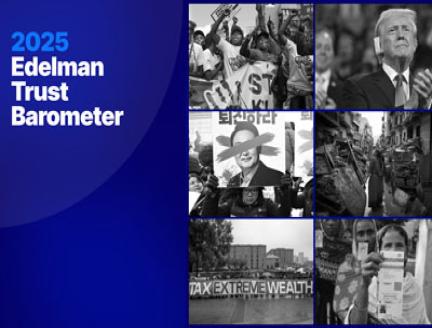A global skincare brand once released an advert across Nigeria, Ghana, Senegal, and Cameroon featuring a household-name celebrity applying a body lotion that visibly lightened her skin. Intended to promote natural radiance, the campaign instead ignited immediate backlash for perpetuating colourist ideals and reinforcing the notion that lighter skin conferred greater beauty or value. Within days, the brand was forced to withdraw the campaign and issue a public apology. But the reputational damage was already done.
This was not an isolated incident. It was one of many avoidable failures that have revealed a persistent blind spot in how global brands approach African audiences: the assumption that market access can precede cultural fluency; and that communications can be deployed before relationships are understood.
Here, public relations and communications must function as strategic infrastructure for trust-building.
According to the 2025 Edelman Trust Barometer – an annual survey of more than 33,000 respondents across 28 countries – there has been a marked trend in public grievance, rooted in widening economic disparities, perceived institutional failure, and growing scepticism toward leadership. Sixty-one percent of respondents globally register a moderate or high sense of grievance, defined by the belief that government and business make life harder, serve narrow interests and wealthy people benefit unfairly from the system. These levels are even more acute across the African continent, where 70% of respondents or more in South Africa, Kenya, and Nigeria express moderate or high grievance toward business, government, and the wealthy.
To lead through this climate of scepticism, brands must understand the lived socio-economic realities of their stakeholders, champion shared interests, and create avenues for optimism. In Africa, that demands an approach anchored in local listening, regional intelligence, and long-horizon trust-building – where strategic communications and advisory does not rely on blanket approaches, but adapts to context as the means by which legitimacy is earned. It demands rootedness – an instinct for local nuance, historical memory, and the dynamics that shape perception across language, class, and region.
A common pitfall for brands entering Africa is the assumption that reputation travels. They overestimate global brand equity and underestimate the work of cultural alignment. This often results in communications that presume familiarity and fail to resonate with intended audiences. Conversely, African firms looking to scale across the continent frequently transpose domestic messaging onto neighbouring markets. What works in Casablanca may fall flat in Abidjan, not because the strategy is unsound, but because the delivery is unmoored from place.
Navigating this environment increasingly requires partnerships with communication advisors who are deeply situated: who understand not only what must be said, but how it will land, where it will circulate, and who will carry it forward. Yet local insight alone is no longer sufficient. As businesses operate across multiple jurisdictions, regulatory environments, and media ecosystems, regional coherence becomes as critical as local relevance. Messaging must be responsive to domestic dynamics, but also legible across borders – whether to regulators, investors, consumers, or civil society. That demands advisors who can work laterally across regions and anticipate how a reputational gain in one context may carry implications in another.
Additionally, it is essential to grasp the distinct economic priorities shaping each region: North Africa positions itself as a manufacturing and logistics bridge between Europe, the Middle East, and the continent; Southern Africa is consolidating its role as an energy and industrial base; East Africa continues to emerge as a hub of digital innovation and integration; and West Africa leverages its demographic scale and cultural influence as engines of market dynamism. This understanding is fundamental to crafting communications that align with local aspirations and position brands as credible participants in each region’s developmental arc.
Leading African firms are responding to this complexity by embedding regionally attuned communications models within their operations. Edelman Africa, for instance, recently launched its Edelman Regional Advisory (ERA) team – a network of senior communications advisors and industry strategists spanning North, East, West, Central, and Southern Africa. The initiative is designed to help clients navigate complex markets, earn trust, and drive impact at scale.
As capital flows sharpen their focus on Africa – the second-fastest-growing region after Asia – those brands able to interpret the nuance between relevance and resonance, between what is said and what is heard, will be better equipped to build legitimacy across markets. They will need partners who can act as both interpreters and integrators, translating insight into institutional advantage.
In a continent defined by transition, one as intricately woven socially, culturally, and economically, trust remains the most enduring form of influence – and it cannot be secured from afar.
Karena Crerar is CEO of Edelman Africa.




